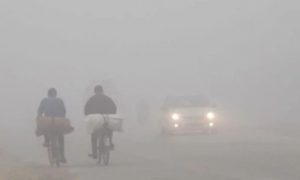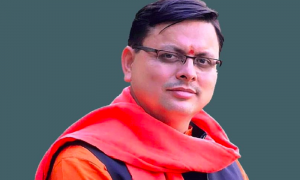RT-PCR tests mandatory; separate isolation unit for those found with new variant
At least 20 passengers coming to India from the UK tested positive for COVID-19 on Tuesday as the government issued a stringent new SOPs mandating RT-PCR tests at all airports for each traveller from the country and isolation in a separate institutional facility for positive cases in view of the new coronavirus strain.
NITI Aayog member V.K. Paul said the new strain of COVID-19 reported in the U.K. seems to increase transmissibility and infection rates but the mutation has so far not affected the severity, and case fatality of the disease.
He added that as of now, the mutation has not been detected in India, and that it would have no impact on the potential of the emerging vaccines being developed in India or internationally. “There is no cause for concern, no need to panic, as for now. But we have to stay vigilant,” Dr. Paul said at a press conference in the national capital.
On direct flights
Of the 20 passengers, six were on a flight that landed in Delhi at 11.30 p.m. on Monday, two on a flight that came into Kolkata on Sunday night, four that arrived in Ahmedabad on Tuesday and eight, including a crew member, in Amritsar also on Tuesday. All flights were direct Air India flights from London.
“Five passengers were found COVID-positive at the Delhi airport. One passenger who took a connecting flight to Chennai was tested there and found positive,” an official in Delhi said.
All incoming passengers from UK were being tested, said Dr Gauri Agarwal, of the Genestrings Diagnostic Center handling coronavirus testing at Delhi airport. The positive samples were sent to the National Centre for Disease Control for research on the new strain using next gen sequencing technology, she said.
With the new guidelines, several hundred passengers were tested at various airports. The process took many hours, resulting in chaos and confusion at several airports, including Delhi, Mumbai and Kolkata.
In Kolkata, a West Bengal Health and Family Welfare Department official said those sitting near the two passengers who were positive will be told to be in home isolation for two weeks.
Deputy Municipal Commissioner of Ahmedabad Municipal Corporation (AMC) Om Prakash Machra said though an AI flight from London landed at 10.30 a.m., the entire process of testing ended only in the evening with 275 passengers tested. Of the four who tested positive, one is a British national.
Testing and tracing
Health secretary Rajesh Bhushan detailed the comprehensive guidelines not just for those arriving from the UK till the travel ban comes into force at midnight, but also for passengers who came from, or through, the U.K. from November 25 to December 23.
Mr Bhushan said passenger lists will be shared with the States/UTs so that their samples are collected for testing. “Contact tracing will be done in positive cases,” he said.
He added that all passengers coming from the UK between December 21-23 will be subjected to RT-PCR test on arrival and in case of a positive sample, it is recommended that spike gene-based RT-PCR test should also be performed by an appropriate laboratory.
Genome sequencing
The Ministry’s guidelines mandate that if the genomic sequencing of a positive patient from UK indicates the presence of new variant of SARS-CoV-2, then the patient will remain in a separate isolation unit while necessary treatment as per the existing protocol will be given.
International travellers from the UK who arrived in India from November 25 to December 8, will be contacted by District Surveillance Officers and advised to self-monitor their health. If anyone among them develops symptoms, they will be tested by RT PCR and standard follow-up action would be initiated.
It added that if any passenger is not traceable initially or during any duration while being followed up, it should be immediately notified to the Central Surveillance Unit of IDSP by the District Surveillance Officer.
The SOP explains that passengers testing positive shall be isolated in an institutional isolation facility in a separate (isolation) unit coordinated by the respective State Health Authorities. They would earmark specific facilities for such isolation and treatment.
“Necessary action to send the samples to National Institute of Virology (NIV), Pune or any other appropriate lab for genomic sequencing will be initiated at the facility level. If the report of the sequencing is consistent with the current SARS-CoV-2 virus genome circulating in the country; the ongoing treatment protocol including home isolation/treatment at facility level as per case severity may be followed,” notes the SOP.
However, if the genomic sequencing indicates the presence of new variant of SARS-CoV-2 then the patient will continue to remain in a separate isolation unit while necessary treatment as per the existing protocol will be given, the patient shall be tested on 14th day, after having tested positive in the initial test. In case the sample is found positive on 14th day, further sample may be taken until his two consecutive samples taken 24 hours apart are tested negative, it added.
Dr. Paul cautioned that this is a smart virus which changes its behaviour and noted that the new strain in the UK has undergone 17 changes, increasing its transmissibility by 70%.
“In a way it has become a super spreader. We are keeping a close watch on the developments and the recently collected virus samples are being prioritized for genetic sequencing,’’ he explained.
Meanwhile, speaking about the process of clearing proposed vaccines in India for emergency use Dr. Paul said that currently there are three applications for approval. “Pfizer has not presented its additional data, the other two companies have shared their data and a new set of data has been provided by at least one company. The data is being examined,’” he said.





































